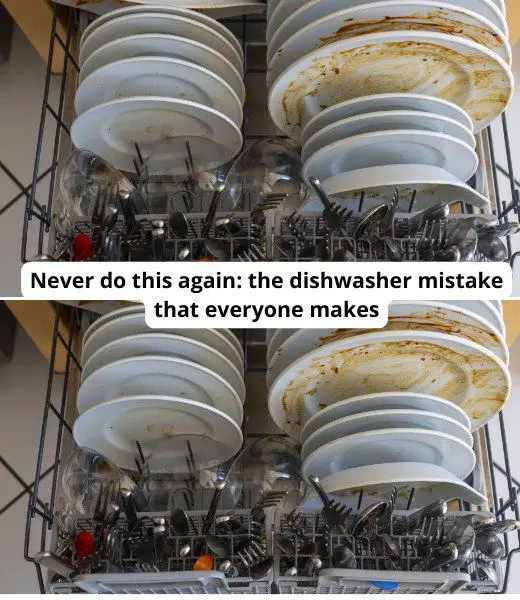
Dishwashers are a true modern-day convenience, making life in the kitchen much easier. However, despite their efficiency, many of us unknowingly make mistakes that can reduce the lifespan of our appliances, damage our dishes, or even result in poorly washed items. One mistake in particular stands out as being incredibly common—and it’s something that’s probably happening in your own kitchen right now.
In this article, we’re going to reveal the dishwasher mistake that everyone makes and show you how to avoid it. By the end, you’ll be washing your dishes the right way, ensuring your dishes are spotless and your dishwasher stays in great condition for years to come.
The Mistake You’re Probably Making
The mistake most people make with their dishwashers is overloading the machine. It’s tempting to pack as many dishes as possible into one load to save time and energy, but this can lead to a variety of problems. Overloading can prevent the dishwasher from cleaning properly, cause dishes to break, and even strain the motor of the appliance, reducing its lifespan.
When the dishwasher is packed too tightly, there isn’t enough space for the water and detergent to circulate freely, which means that food particles and grime can get trapped on dishes. This results in dishes that aren’t cleaned properly, often requiring a second wash. Furthermore, overcrowding can lead to dishes knocking into each other and possibly breaking.
Why Overloading Is Harmful
There are several reasons why overloading the dishwasher can cause problems:
- Ineffective Cleaning: Dishwashers are designed to use a stream of water to clean the dishes. When there are too many items crammed into the machine, the water can’t reach all of the dishes. As a result, some dishes end up with leftover food residue, grease, or soap.
- Dish Damage: Overloading the dishwasher increases the risk of items bumping into each other. Glasses, plates, and delicate items are particularly vulnerable to breakage when they’re forced into the machine without enough space to move around.
- Strain on the Dishwasher: When you overload your dishwasher, it’s forced to work harder than it was designed to. This can cause wear and tear on the motor and spray arms, reducing the overall lifespan of the appliance and increasing the likelihood of expensive repairs.
- Increased Energy and Water Use: Overloading the dishwasher might seem like a time-saving tactic, but it can actually lead to inefficient cleaning. You may need to run multiple cycles to get your dishes fully clean, using more water and electricity in the process.
How to Avoid Overloading Your Dishwasher
Now that we know the problems associated with overloading the dishwasher, let’s go over the best practices for loading it properly to maximize both cleanliness and efficiency.
1. Follow the Manufacturer’s Guidelines
Every dishwasher model is different, and manufacturers provide guidelines on how to load it efficiently. Be sure to read the user manual for your specific dishwasher, as it will provide helpful tips on how to arrange your dishes for the best results.
2. Organize Dishes by Size
When loading the dishwasher, start by placing the larger items on the bottom rack. This includes plates, pots, and pans. Leave space between these items to allow water to circulate around them. On the top rack, place smaller items like glasses, cups, and bowls. Avoid stacking them too closely together.
Tip: Place bowls and cups upside down to ensure that water doesn’t pool inside them. For glasses, place them in the top rack, and ensure that they’re spaced apart to prevent chipping and breakage.
3. Place Silverware in the Proper Bin
Silverware should be placed in the dishwasher’s designated silverware bin. Avoid overcrowding the bin, as silverware needs space to get properly cleaned. Forks, spoons, and knives should be placed with their handles facing down to ensure a thorough cleaning. However, knives should be placed with the handles up for safety reasons.
Tip: If your dishwasher has a special compartment for larger utensils (like serving spoons or ladles), make use of it. This allows these items to be cleaned more efficiently, preventing them from touching other dishes and blocking the spray arms.
4. Ensure the Spray Arms Are Unblocked
For your dishwasher to work properly, the spray arms must be able to rotate freely. Before starting a load, make sure that none of the dishes are obstructing the spray arms. If the spray arms are blocked, water won’t be able to reach all of your dishes, resulting in an incomplete clean.
5. Leave Some Space
While it may be tempting to fit as many dishes as possible into one load, it’s important to leave some space between items. Crowding the dishwasher will prevent the water and detergent from circulating freely. Ensure that there’s enough room for water to reach each dish for an optimal cleaning experience.
6. Avoid Overloading the Top Rack
The top rack is typically reserved for lighter, smaller items, such as glasses, cups, and bowls. If you overload this area, these fragile items are more likely to tip over, break, or not get properly cleaned. Arrange cups and glasses carefully, ensuring they are secure but not crowded together.
What to Do If You’ve Already Overloaded the Dishwasher
If you’ve already overloaded the dishwasher and notice that the dishes didn’t come out clean, don’t worry! You can still salvage the situation by reloading the dishes properly and running another cycle. Here are some steps to follow:
- Empty the Dishwasher: Carefully remove the items that didn’t get cleaned properly and set them aside.
- Rearrange the Dishes: Remove any items that are blocking the spray arms, and reorganize the dishes so that there’s space between them. Ensure that everything is positioned correctly and that delicate items are secure.
- Run a Shorter Cycle: Once the dishwasher is properly loaded, run a shorter cycle (if possible) to clean the remaining items.
Other Common Dishwasher Mistakes to Avoid
In addition to overloading, there are a few other common mistakes that can impact the performance of your dishwasher:
- Using Too Much Detergent: Using excessive detergent can cause soap scum buildup, leaving a residue on your dishes. Stick to the recommended amount.
- Not Cleaning the Dishwasher Filter: The filter traps food particles, but it can get clogged over time. Regularly clean the filter to ensure your dishwasher operates efficiently.
- Forgetting to Clean the Spray Arms: The spray arms can accumulate food particles and debris. Periodically check them and clean them to ensure they don’t get blocked.
Conclusion
While dishwashers are an incredibly convenient appliance, overloading them is a common mistake that can lead to dirty dishes, broken items, and costly repairs. By following the tips outlined in this article, you can ensure that your dishwasher works efficiently and your dishes come out sparkling clean every time.
So, the next time you load your dishwasher, remember to leave space between your dishes, follow the manufacturer’s guidelines, and avoid overstuffing. Your dishwasher—and your dishes—will thank you!



